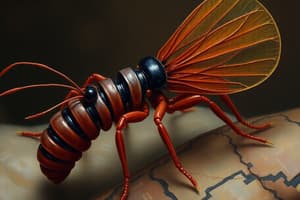Podcast
Questions and Answers
Which phylum is not classified as an invertebrate?
Which phylum is not classified as an invertebrate?
- Echinodermata
- Mollusca
- Arthropoda
- Chordata (correct)
What does the prefix 'in-' in 'invertebrate' signify?
What does the prefix 'in-' in 'invertebrate' signify?
- Turning
- Not (correct)
- Jointed
- Spinal
Which invertebrate phylum has a greater number and diversity of species than the entire subphylum of Vertebrata?
Which invertebrate phylum has a greater number and diversity of species than the entire subphylum of Vertebrata?
- Annelida
- Mollusca
- Arthropoda (correct)
- Echinodermata
'Invertebrates' is considered a paraphyletic grouping because:
'Invertebrates' is considered a paraphyletic grouping because:
'Tunicata' and 'Cephalochordata' are sister chordate subphyla to Vertebrata, making the term 'invertebrates' rather polyphyletic. What does polyphyletic mean in this context?
'Tunicata' and 'Cephalochordata' are sister chordate subphyla to Vertebrata, making the term 'invertebrates' rather polyphyletic. What does polyphyletic mean in this context?
Flashcards
Invertebrate phylum with most species
Invertebrate phylum with most species
Arthropoda, an invertebrate phylum, has more species than the vertebrate subphylum.
Meaning of 'in-' in 'invertebrate'
Meaning of 'in-' in 'invertebrate'
'In-' means 'not'.
Vertebrate exclusion from invertebrate group
Vertebrate exclusion from invertebrate group
Vertebrates (Chordata) are excluded from the invertebrate group.
Chordate subgroups and 'invertebrates'
Chordate subgroups and 'invertebrates'
Signup and view all the flashcards
Invertebrate definition
Invertebrate definition
Signup and view all the flashcards
Study Notes
Characteristics of Vertebrates and Invertebrates
- Chordata phylum is classified as vertebrates.
- The prefix 'in-' in 'invertebrate' signifies "without" or "not".
Invertebrate Diversity
- The phylum Arthropoda has a greater number and diversity of species than the entire subphylum of Vertebrata.
Classification of Invertebrates
- Invertebrates are considered a paraphyletic grouping because they do not form a monophyletic group, meaning they do not share a common ancestor.
- The term 'invertebrates' is rather polyphyletic, meaning it is a grouping of organisms that do not share a common ancestor, but rather have distinct evolutionary paths.
Related Chordate Subphyla
- Tunicata and Cephalochordata are sister chordate subphyla to Vertebrata.
Studying That Suits You
Use AI to generate personalized quizzes and flashcards to suit your learning preferences.




